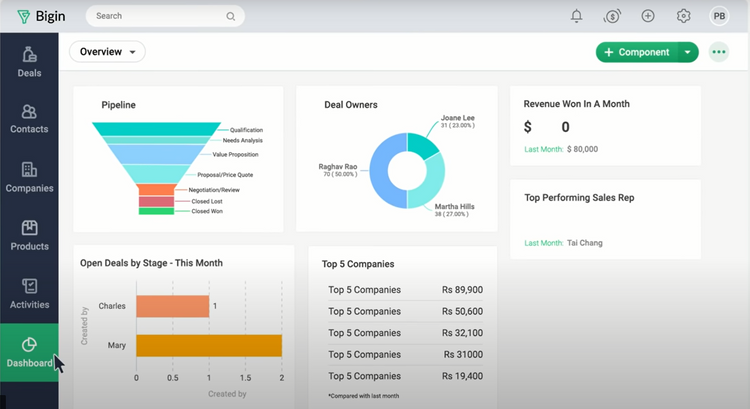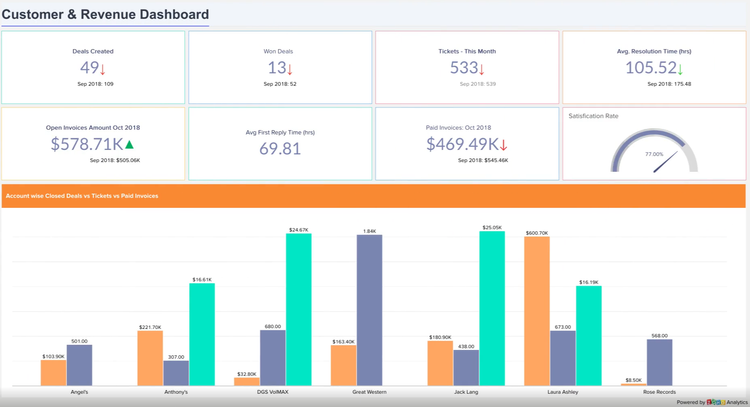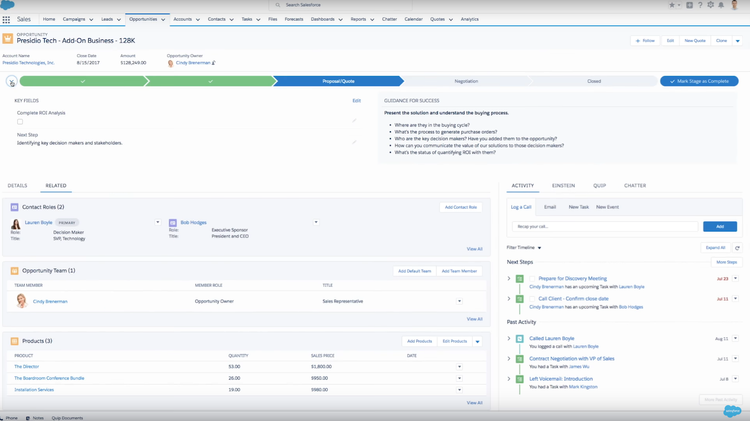The Best Small Business CRM Software
Get the best software for your business. Compare product reviews, pricing below.
What is CRM Software for Small Businesses?
Customer relationship management (CRM) software provides the tools your business needs to maximize the potential of your customer relationships. While every company needs to maintain good relationships with consumers, these are an especially important resource for small businesses which are dependent on early and consistent loyalty.
If you are a local shop or new microbusiness, you might think you can get away with just manually maintaining a record of your customer base. Yet as your work grows you can lose track of this information. CRM software for small businesses and startups can automate data collection so you can tailor your marketing, sales, and customer service efforts to fit their needs. No need for a Rolodex or complex spreadsheets when everything is at your fingertips with a CRM platform.
Features of CRM Software
- Contact management: Provide your business with the ability to capture, record, and classify event data related to all customer interaction from calls, emails, purchases, and in-person or website visits
- Opportunity and/or lead tracking: Depending on the nature of your business, detail different types of sales prospecting information, such as the original lead source and sales assignment
- Customer order history: Automatically capture customer purchases via integration with invoicing and AR applications to complete the information about each successful customer interaction
- Marketing campaign management: Organize and track marketing efforts through traditional or social media channels based on demographic and promotional sales targeting
- Marketing email/template management: Create, store, and edit marketing templates provides increased efficiency and more consistent use of best practice communications techniques for maximizing marketing effectiveness
- Email integration: Automatically capture virtual correspondence with customers to record their purchasing behavior
- Call center integration: Facilitate outbound calls and automatically identify when customers have been called with existing customer records
- Call scripts: Customize call scripts used by sales teams to ensure adherence to best practices and help salespeople overcome improve the customer experience
- Follow-up scheduling: Schedule customer follow-up phone calls, emails, or social media messages to help improve the reliability of timely communication

Best CRM Software Benefits for Small Businesses
CRM platforms offer many ways to support sales, marketing, and service activities. Key benefits of utilizing a CRM software at your small business include:
Build Relationships through Data Automation
Whether you operate a new startup or have been running a small business for years, the key to success is keeping your customers happy so they keep coming back. Building authentic relationships with your customers is vital for your continued success. Yet how do you interact with hundreds or even thousands of loyal customers? The easiest way is to implement CRM software made specifically for a small business.
Instead of relying on spreadsheets or even a traditional file index which have to be continually updated manually, a CRM platform automates the intake of new customer information and sales activities in real-time. This lead management system streamlines the sales pipeline so reps can focus on selling rather than taking down information.
Once you have the initial customer data, you need it to be organized and accessible. An integrated CRM solution makes it easy to retrieve stored information without the need for manually going through spreadsheets. And you can indicate which metrics are the most important about each customer to improve customer satisfaction rates.
For instance, analyzing customer data may reveal certain demographics respond better to email marketing than cold calls. You can then direct your sales department to focus on sending out emails rather than wasting time on other outreach methods which are less likely to work.

Maximize Your Workflow
Small businesses are defined as those with under 20 workers, with many operating with only 10 employees. And a new startup may have only one employee filling every role. By adding a CRM software to your roster of business intelligence tools, you can free up your limited employees to focus on other tasks, such as interpreting customer data to increase sales opportunities.
Small business CRM platforms give you the ability to track buying patterns, which can help you identify patterns with your customer relationships. It’s so much more cost effective to retain your current customers, especially when you take into account all the additional marketing costs it takes to establish new relationships.
Customizable call scripts and user-friendly email templates further streamline the sales process. Reps with minimal training can automatically send out emails with company-approved language or make cold calls without wondering what to say, allowing them to get right to the point in each customer interaction.
Finally, customer data can be shared through the CRM platform between different sales reps. If someone from your company retires or goes on a vacation, their accounts can be covered by anyone without interruption thanks to detailed information accessible through CRM software.
Integrate Customer Information with Sales Data
Want to improve your sales tactics? Start using customer data to identify buying patterns! A CRM platform can help you automate this task by consolidating this information into easily readable reports. Your sales teams can then analyze the results and adjust their lead management and follow-up communication tactics accordingly.
You can improve your overall business performance by compiling useful information from finance, sales, marketing, and customer service into a central database. Tracking milestones in customer engagement can further improve sales forecasting by suggesting appropriate follow-up actions to mark the occasion. And keeping all your customer data in one CRM platform allows you to build long-term customer relationships and improve your sales performance.
For example, cross-selling is an easy way to increase sales. By analyzing past customer behavior, sales reps can anticipate what other products or services customers will want. CRM applications with marketing automation tools also allow your sales staff to easily up-sell or cross-sell your products, which can increase your revenue totals and help your business to succeed.

Small Business CRM Software Pricing
One of the major reasons small businesses and startups don’t have a CRM system is the cost. Fortunately, CRM platforms are growing more affordable than ever, especially since providers can scale solutions to match your business size. There are even free versions available, though this is sometimes limited to brand new startups or companies with limited users. Monthly subscriptions for CRM software tend to range from $14 to $45 per user.
Many CRM solutions can scale with your business, so as you grow you can keep up with your expanding customer base and their associated needs. Unfortunately, as your business grows, so will the costs of your CRM platform and any mobile apps. Implementation, training, and further customer support can also increase your total costs. However, effectively using a customer relationship management platform can streamline your workflow and reduce labor costs elsewhere.

